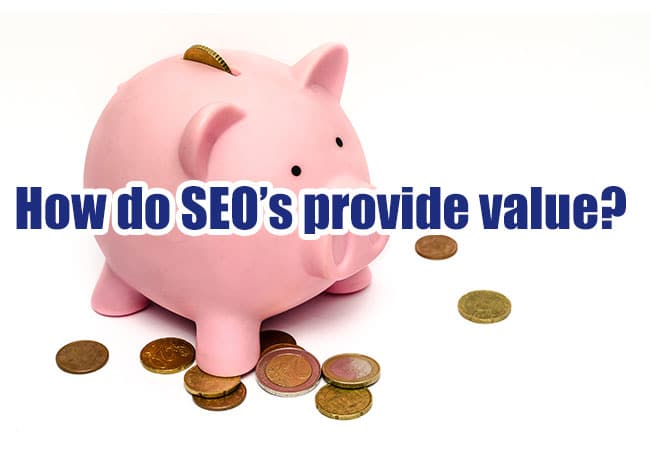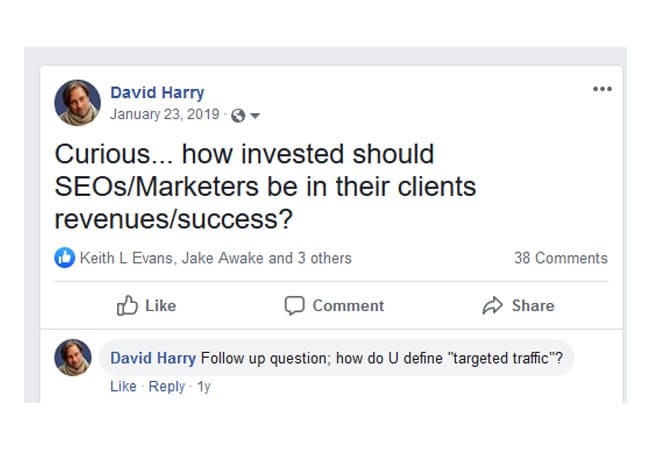When working as an SEO we tend to know what the job is; ranking pages. How we go about that varies widely depending on the needs of the site, the business and the resources at hand. Forget the old “SEO is Dead” mantra, SEO is more complicated than ever. Your strategy is more important than ever.

But does it end there? Do we also need to establish ROI for our efforts? I used to say to clients, “if you don’t make money; we don’t make money”. Intimating that the SEO does indeed need to show some value from their efforts, or why would the client continue to pay?
Talking to the Experts
This very topic was something I mused about a while ago and headed off to my Facebook network to see what other’s thought. What follows are some of the more interesting/valuable replies.

Below are some of the more interesting answers we got…
Frank Waston; their success is your success. I usually work from a modest base then everything else is on CPA and volume for paid and conversion and traffic numbers increase of organic. If you can monitor ROAS and say initial goal is 6 times return and keep the volume at a certain number and bring in at 10 times there are bonuses – tying their success to your pay makes the arrangement a win win for both parties.
Don Vermeer; Depends on the kind of contract you have with them. Incidental, % etc. I’d go with the clients responsibility. If you’re solo or have an agency you simply don’t have the time to be super involved. You get hired for X job for Y price. You do your best and give them growth in that area. Upselling is always an option for Z (like CRO) or further down the line after a while you can re-adjust your targeted effort, for example when you’ve done the SEO part a while and you can focus less on on-page and more on CRO for example if it’s been ‘done’ and only requires minor adjustments.
It also depends of course on what you can offer in terms of your own ROI. There is no point in spending 20 hours on a client while being paid 5 just to be the nice guy. It’s all about boundaries. If you’re on a % based contract you involve yourself more, since more revenue = more money for you so in the end it’s good for yourself as well. If it’s incidental, you shouldn’t spend your time licking ass or involving too much.
Christopher Fleming; if your clients fail you fail as a business it’s pretty simple really! Imagine being known as an SEO agency whose every single client failed nobody would ever use you again lol. You should still care as they are your client. I mean what if everything they do is fine but it’s maybe their websites copy that’s letting them down or its aimed at the wrong audience or isn’t getting in front of the right eyes that’s our concern for sure!
David Ogletree; Most of the time I am very invested in my clients. If it is somebody that refuses to do what I tell them to do and they continue to make stupid decisions then I just give up on them. I will still take their money and do what they pay me to do. I just consider it contract work at that point.
Benj Arriola; If you were hired mainly for the overall SEO strategy, I would say 100%. They hired you with the intent to make more money with SEO, and if they don’t, they won’t hire you again.
If you were hired by an agency that did the SEO strategy and you are just like doing 1 thing in their whole SEO process, whatever it is, an audit, content writing, outreach, etc. It can be 0%. It is the responsibility of the agency that hired you to look after the profitability of their strategy. And you are just responsible for completing the outsourced task.
Now if you were hired to do the main SEO strategy, you and the client should be on the same page on what type of revenue is realistically possible. Some clients can have rediculous, outrageous revenue expectation from SEO even if their products suck compared to the competition. Or every customer hates them because customer support sucks or whatever negative thing. And we can only suggest things as SEO, but not really be business consulatants tell them how to run their business better. (Unless you are a business consultant, like those life coach, bussines coach guys.)
Sarah Carling Polk; eh, mostly I would say if you’re not increasing revenue then you’re failing, but I have worked with clients who have saboteurs in the organization who insist on putting the effort in all the wrong places and sometimes you just have to say your piece and let them do what they want to do. At that point, their revenue stops being your problem IMO.
Ammon Johns; Chief Cheerleader. Mentor to da moneyz. But in my case at least, I still like to steer clear of profit shares. I think that is partly due to the fact that, when I started out, you could often increase profit of companies back then by 1,000 percent or more, and that would be just exploitation, demotivating the business owner.
Brent D. Payne; I have some contracts where I get 85% of OP gains from SEO and others are a flat $5K monthly retainer. The client let’s you know how tied to revenue they want you to be in the contract negotiation. My heart and mind follow that negotiation.
Steve Toth; Targetted traffic for a SaaS is simple.. do they start a trial and do they upgrade. It’s much merkier with lead gen, but you can test keywords with PPC to before try to rank organically. Yes, you should be 100% invested. Clients also love it when you can add value beyond your core service too.
Scott Clark; Very invested. I don’ feel successful until the client is, no matter what my fees are tied to. But we cannot tie our fees to revenue success when we have such little control over execution or the sales process, particularly when that process is multi-touch. Turf battles, staff changes and reluctance to “leaps of faith” required for SEO (perhaps by executives) are examples that undermine projects – often well into the project. Our agreement has an exit clause specifically for this situation, since staff changes frequently occur during a retainer.
I think one big secret to shoring up these issues is to get good at calculating opportunity costs and putting real revenue or growth losses tied to poor performance in SEO. Use this language throughout conversations as most companies I’ve worked with, even $1-3B companies, leave those columns off the spreadsheet!
Your Turn; Speak Out
So that’s what some of the pros had to say. Me? Obviously I am a huge believer in providing value. That being said, there are instances where the CRO (conversion rate optimization) needs some work. There are going to be times where you need to look at the usability and conversions of the site to get a true sense of your value as an SEO. Putting lipstick on a pig just won’t work.
Anyway, so what’s your thinking? Let us know in the comments.